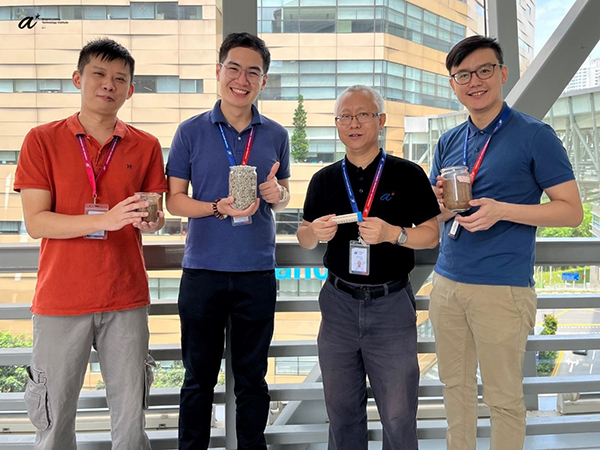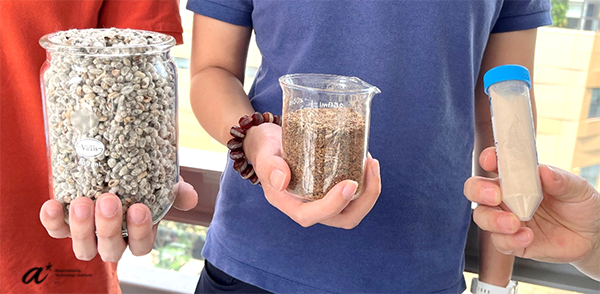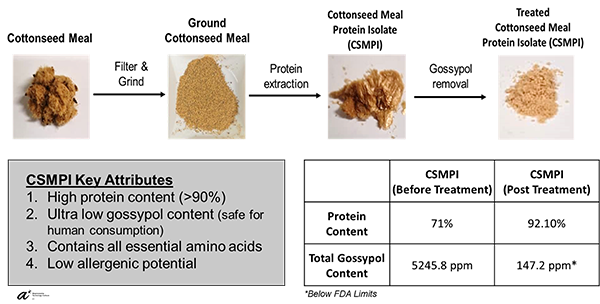Cottonseed Meal as a potential source of plant-based alternative protein
Science
Cottonseed meal (CSM) is an oil industry side-stream with high protein content that is produced during oil extraction from cotton seeds. CSM is used as livestock feed for adult animals like cows, goats and sheep. However, it is not suitable for human consumption as there are toxic gossypol compounds in the CSM. As part of food sustainability, we decided to valorise CSM as a source of alternative protein. We have developed an efficient method that could make CSM suitable for human consumption by producing CSM protein isolate (CSMPI) of high purity with ultra-low gossypol content. Further analysis was conducted to understand the nutritional and functional quality of CSMPI which facilitates nutritive human food application. In the near future, CSM can be an accessible and nutritional source of alternative protein.
Societal Impact
More than 10 million tonnes of CSMs are produced annually as a by-product of the oil extraction process. Despite their high protein content and huge biomass, CSM cannot be used in food products due to its high gossypol content and they are either mostly discarded or used as livestock feeds. We seek to address this issue by developing a gossypol removal treatment and was able to reduce the total gossypol content in the CSMPI by 97%, to a level that is suitable for human consumption. Furthermore, the treatment improved the protein content from 71% to 92.10%. With an ever-growing population, innovative agri-food development is required to feed the world sustainably. Our study demonstrated the viability of CSM being a new alternative protein source for nutritious food applications.
Technical Summary
Our team has developed a protein extraction process that incorporated a multistep acidified organic solvent-based gossypol removal treatment to produce a CSMPI with improved protein content (>90%) and an ultra-low gossypol content. The gossypol removal treatment removed both free and bounded gossypol, leading to a total gossypol content of 147.2 ppm [FDA Limits: Free Gossypol <450 ppm]. The data produced using a mass-spectrometry-based proteomics approach showed that the treatment did not affect the protein composition and integrity. CSMPI also contained all the essential amino acids and was rich in branched-chain amino acids (BCAAs). Further characterisation was performed to evaluate the suitability of CSMPI in food applications for human consumption.
Functional properties of CSMPI were benchmarked against commercial pea protein isolate and CSMPI exhibited higher oil absorption capacity and water solubility. Through a combination of mass spectrometry-based protein digestibility profiling and in-silico allergen analysis, CSMPI was assessed to have low allergenic potential. Overall, we have generated a protein isolate from CSM that should be safe for human consumption, highlighting CSM as a promising source for alternative protein production.
References
Tan, C.F.; Kwan, S.H.; Lee, C.S.; Soh, Y.N.A.; Ho, Y.S.; Bi, X. Cottonseed Meal Protein Isolate as a New Source of Alternative Proteins: A Proteomics Perspective. Int. J. Mol. Sci. 2022, 23, 10105. https://doi.org/10.3390/ijms231710105
A*STAR celebrates International Women's Day

From groundbreaking discoveries to cutting-edge research, our researchers are empowering the next generation of female science, technology, engineering and mathematics (STEM) leaders.
Get inspired by our #WomeninSTEM
.png?sfvrsn=1a7df424_3)


